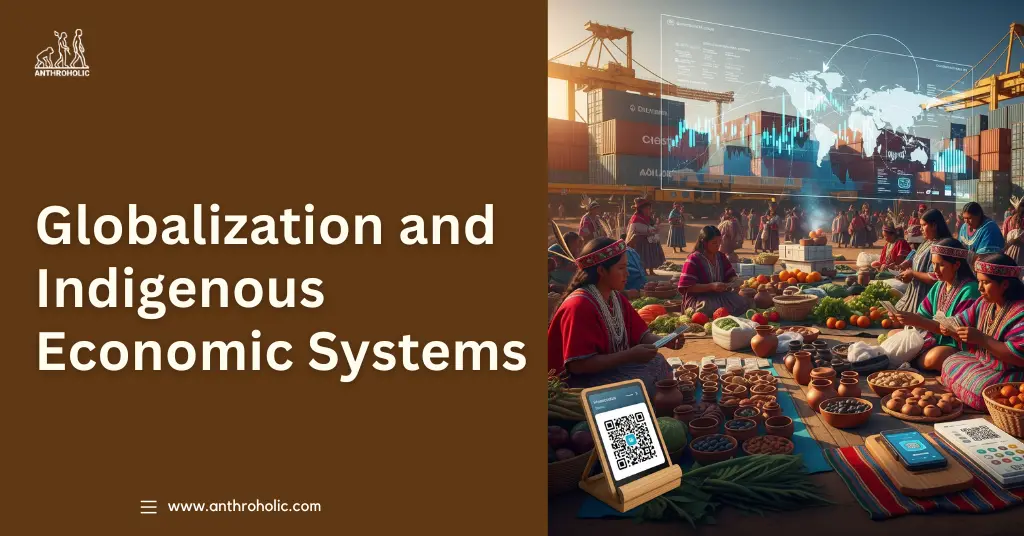AI Answer Evaluation Platform Live Now. Try Free Answer Evaluation Now
Globalization and Indigenous Economic Systems
Globalization, the interconnectedness and interdependence of different world economies, has dramatically changed the way societies interact and conduct business. However, this integration has not equally benefitted all participants. Particularly impacted are indigenous economic systems that are often at odds with the mainstream capitalist model.

Understanding Indigenous Economic Systems
Indigenous economic systems are unique in that they encompass more than just the monetary aspects of the economy. They include:
- Traditional Knowledge: Indigenous people have deep understanding and knowledge about their land, resources, and community that form an integral part of their economy.
- Community Ownership: Unlike capitalist systems where individual ownership is prevalent, indigenous economies often emphasize community ownership.
- Sustainability: Indigenous economies prioritize long-term environmental sustainability over short-term profits.
- Circular Economy: These systems often feature reciprocity, sharing, and trade, rather than accumulation of wealth.
Impact of Globalization on Indigenous Economic Systems
As globalization has expanded, indigenous economic systems have experienced significant disruptions.
- Loss of traditional knowledge and skills: Globalization often introduces modern technology and methods, overshadowing and replacing indigenous knowledge and skills.
- Land and Resource Appropriation: Global businesses, in their quest for resources, often end up appropriating indigenous lands, disrupting their way of life and economy.
- Cultural Erosion: Global cultural influence can weaken indigenous identity and values, impacting the community-centric nature of these economies.
- Environmental Degradation: The exploitative resource extraction practices of global companies often disregard the environmental sustainability principles central to indigenous economies.
Reconciliation: Integrating Indigenous Economic Systems into Global Markets
As the negative impacts of globalization on indigenous economies become more apparent, there is an urgent need to integrate these systems into the global economy, while preserving their unique attributes.
Opportunities for Integration:
- Recognize and Respect Indigenous Rights: Governments and international organizations should protect indigenous land rights and their right to self-determination.
- Preservation of Traditional Knowledge: Establishing frameworks for protecting and promoting indigenous knowledge can aid their integration into the global economy.
- Incorporate Sustainable Practices: Global markets could learn from the environmental sustainability ethos of indigenous economies.
- Fair Trade and Partnerships: Ensuring fair prices and ethical partnerships can offer indigenous communities the opportunity to participate in the global economy without exploitation.
Case Studies: The Experience of Indigenous People Around the Globe
To better understand the interaction between globalization and indigenous economies, let’s look at two case studies.
1. The Maasai of East Africa
- Impact of Globalization: Land encroachment for agriculture and tourism has displaced the Maasai from their traditional lands, disrupting their pastoral lifestyle.
- Integration Efforts: Conservation tourism initiatives have provided a platform for the Maasai to earn income while preserving their traditional practices and promoting sustainable tourism.
2. The Sami People of Scandinavia
- Impact of Globalization: Large-scale mining has threatened Sami reindeer herding, a key economic activity.
- Integration Efforts: Legal efforts to recognize Sami land rights and legislation mandating the right to consultation are helping to protect the Sami economy and way of life.
The Future of Indigenous Economic Systems and Globalization
Looking forward, it is crucial to continue the conversation on how globalization impacts indigenous economic systems. Future steps could include:
- Policy Development: Governments, especially those with indigenous populations, should develop policies that protect indigenous rights and promote their economic participation.
- Research and Advocacy: Continued research into the impacts of globalization on indigenous economies and advocacy for their rights is essential.
- Sustainable and Ethical Business Practices: Businesses should adopt practices that are respectful of indigenous rights and that incorporate sustainable practices.
Economic Resilience and Self-Determination: A New Approach to Globalization
In the face of increasing globalization, indigenous communities worldwide have demonstrated remarkable resilience, adopting innovative solutions to navigate the changing economic landscape. Key to their success has been self-determination, the right to control their own social, cultural, and economic destinies.
Self-Determination in Action:
- Indigenous Cooperatives: Indigenous communities are forming cooperative businesses to participate in the global economy on their own terms. These cooperatives often uphold traditional values, like collective ownership and sustainable resource management.
- Cultural Tourism: Indigenous communities are capitalizing on the rising demand for unique, authentic travel experiences. By developing and managing their own cultural tourism initiatives, these communities can earn income while preserving and sharing their unique heritage.
- Certification and Branding: Indigenous communities are using certifications and branding to differentiate their products in global markets. This strategy adds value to their products while highlighting their unique cultural heritage and sustainable production methods.
Promoting Equitable Participation in the Global Economy
Promoting the equitable participation of indigenous economic systems in the global economy requires a multifaceted approach:
- Legal Frameworks: Laws at the national and international levels should protect indigenous lands, resources, and intellectual property rights.
- Capacity Building: Indigenous communities should be provided with resources and training to build their business skills, improve their market access, and negotiate fair trade agreements.
- Access to Finance: Indigenous businesses should have access to affordable credit and investment to grow their operations.
- Market Recognition: Consumers and businesses should recognize and value the unique attributes of indigenous products and services, from their cultural significance to their sustainability.
The Way Forward: An Inclusive Global Economy
Building an inclusive global economy that respects and integrates indigenous economic systems is not only just, but it’s also beneficial to all. Indigenous economies offer valuable insights on sustainable practices and community-centered development, contributing to a more equitable and resilient global economy.
Moving forward, it is vital to shape a global economy that respects and supports indigenous economic systems rather than undermining them. This requires policy initiatives at multiple levels, from local to global.
Locally, there is a need to strengthen the capacities of indigenous communities to engage with global markets effectively. This could involve providing training in business skills, facilitating access to credit, and improving infrastructure for production and marketing.
Nationally, governments can create enabling environments for indigenous economies. This could involve recognizing indigenous land rights, providing legal protections for traditional knowledge, and implementing policies that promote fair trade and ethical sourcing.
Internationally, there is a need for global governance mechanisms that ensure the rights of indigenous communities are protected in global markets. This could involve strengthening existing frameworks like the Nagoya Protocol and developing new ones that address emerging issues such as digital intellectual property and climate change.
Conclusion
In summary, while globalization presents numerous challenges to indigenous economic systems, it also offers opportunities. Indigenous communities are demonstrating resilience and innovation in the face of these challenges, carving out their own space within the global economy. For this to continue, there needs to be greater recognition and respect for indigenous rights and knowledge at all levels, from legal systems to marketplaces. With this recognition and respect, an inclusive global economy that benefits all can be achieved.



